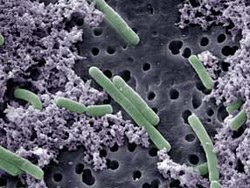
Through the process of fermentation, milk can be even more digestible. This is accomplished through several strains of bacteria that are already present in raw milk.
Some bacteria can be added. How, you may ask? Through foods that are drived from soured milk like yogurt and kefir. These provide plenty of health benefits to those that eat them. These bacteria are acid lovers and will survive through the stomach acid and make their way into the intestines, where they really do their work.
While there, some of them make enzymes the help break down protiens. This is a major benefit to those with digestive problems from age, pharmaceutical side effects, or illness.
Other strains work by creating lipases that chop triglycerides into useable chunks. And others take on the milk sugar (lactose) and make lactic acid out of it.
Having lactic acid working for you can be a good thing. It's not just the pain you get from a hard workout. The lactic acid, created by the digestion of the lactose, helps your body absorb calcium, iron, and phosphorus, breaks up casein and helps prevent bad bugs.
Raw milk is a living food with remarkable self-protective properties, but here's the kick: most foods tend to go south as they age, raw milk just keeps getting better.
Some bacteria can be added. How, you may ask? Through foods that are drived from soured milk like yogurt and kefir. These provide plenty of health benefits to those that eat them. These bacteria are acid lovers and will survive through the stomach acid and make their way into the intestines, where they really do their work.
While there, some of them make enzymes the help break down protiens. This is a major benefit to those with digestive problems from age, pharmaceutical side effects, or illness.
Other strains work by creating lipases that chop triglycerides into useable chunks. And others take on the milk sugar (lactose) and make lactic acid out of it.
Having lactic acid working for you can be a good thing. It's not just the pain you get from a hard workout. The lactic acid, created by the digestion of the lactose, helps your body absorb calcium, iron, and phosphorus, breaks up casein and helps prevent bad bugs.
Raw milk is a living food with remarkable self-protective properties, but here's the kick: most foods tend to go south as they age, raw milk just keeps getting better.
Raw milk can help you digest and intake vitamins, minerals, and overall digestion. This is something to consider for old age. Folks, all I can really say is that we are "fearfully and wonderfully made". And, so is the food we eat. We need it and we live in a society that tells us all foods are bad, except what they deem proper in the form of the government food pyramid. I have talked to several folks that I know in the medical field and asked how much time they spend, in medical school, learning nutrition. The common answer I recieve is less than 2%. Think about that in relation to the "experts" and their food pyramid.
There might be one more installment in this series, so keep checking. Thanks for stopping by.
No comments:
Post a Comment